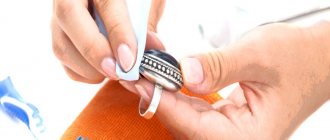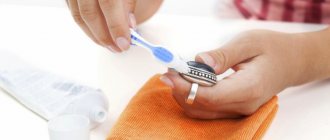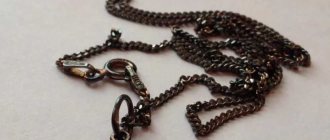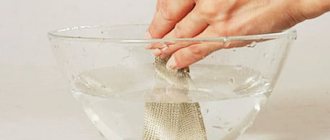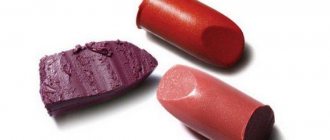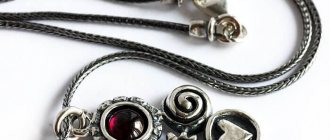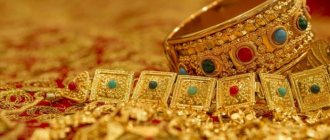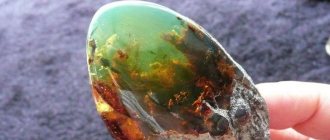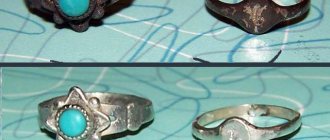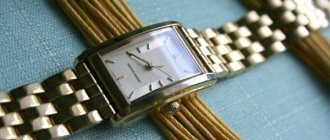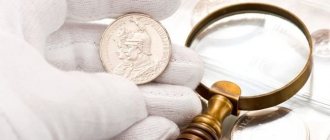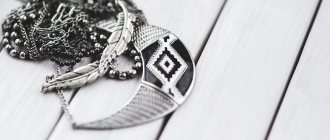Gold plated jewelry has always been popular. They look quite luxurious and elegant and at the same time are much cheaper than gold items. But, like any jewelry, gold-plated silver requires careful care.
If you notice that a dark coating has begun to appear on your favorite rings and chains, this is a sign that the jewelry needs to be cleaned. There are different methods for cleaning gold-plated silver, but not all of them are reliable or safe for your jewelry.
We are sharing with you proven ways to clean gold-plated silver at home quickly and safely.
Why does gold-plated silver darken?
Gilded silver is silver with a thin layer of gold on the surface. And over time, dark spots and a slightly greenish coating appear on silver jewelry with gilding (this is exactly the difference between gilded silver and pure silver).
We explained why pure silver turns black here. But how does blackness appear on a gold-plated product? Yes the same.
The reason may be either improper wearing (during cleaning or training), or careless care and storage. A dark coating on gold plating may appear due to interaction with household chemicals, cosmetics, certain medications, or due to contact with sweat or storage in a high humidity environment.
Therefore, if you want to keep silver and gold-plated items in their original form, do not forget to take care of them and clean them at least once every six months.
How to preserve gold plating: care recommendations
Try the following tips to keep your jewelry and silverware looking bright and shiny longer:
- Remove jewelry while playing sports, in the bathhouse, bath, shower, and when applying skincare and decorative cosmetics.
- Store gold-plated silver separately from items made from other precious metals. You should not put it in cardboard boxes, as the sulfur contained in this material can damage the coating. Wooden boxes are better suited for this.
- Wipe items regularly with a soft cloth such as suede or flannel.
- Don't take jewelry with you to the beach. Both sand and salt water can damage them.
The above recommendations will help preserve the gilding for as long as possible, but not forever. Depending on the quality of the coating and the characteristics of use, the layer will last from 3 to 15 years. Then you will have to contact a jeweler for re-gilding.
Features when cleaning gold-plated silver
But you need to approach cleaning gold-plated silver wisely. Not all products are suitable, and some can damage thin gold plating.
Therefore, we immediately reject methods suitable for purifying silver or gold. And in order not to damage the gold plating, you need to prepare the product before cleaning.
- We take alcohol or turpentine and a soft cloth (you can use suede, wool or flannel. These materials carefully remove stains from the surface and add shine to things).
- We wet a cloth in the substance and carefully remove dirt and dust from the surface of the gold-plated silver.
- And only then can you proceed directly to cleaning the jewelry.
How not to clean gold plate
To quickly and correctly clean a gold-plated silver item, you need to know which products are suitable for treatment and which are not. It is forbidden to use abrasive compounds for cleaning, because they can ruin the spraying. The use of the following means is also not permitted:
- Tooth powder or paste.
- Powdered chalk.
Gold jewelry can withstand such treatment normally, but gold-plated models are severely scratched or completely lose their plating.
If there are precious stones, cleaning should be carried out with extreme caution, avoiding methods that involve immersing objects in solutions. If you miss this moment, the fragile fastening or adhesive base holding the stone will be damaged.
Another requirement applies to products with fasteners. Cleaning should be as delicate as possible, because... fasteners are made of simple metals and are subject to rust.
If you do not have the skills to clean gold-plated silver, it is better to entrust the procedure to an experienced craftsman. Any careless actions can worsen the condition of the jewelry or completely erase the gilding.
Cleaning products
Before you clean gold-plated silver items, you need to choose the cleaning product itself. For such things, only soft, gold-plating compatible compounds are suitable, which will not damage or scratch the thin surface layer of gold. Therefore, we immediately remove any abrasive products away.
To clean gold-plated silver, you can use both professional cleaning products and time-tested folk recipes.
Toothpaste
It seems that toothpaste is used to clean everything, and gold-plated silver is no exception. To clean a small stain, lightly wet the item and apply toothpaste over the entire surface and wipe with a lint-free cloth. With this method, it is not recommended to use even a soft toothbrush, as it can leave micro-scratches on the gold plating. Suede or flannel fabric will be an excellent alternative to a brush.
Yolk
Chicken yolk will help restore your jewelry to its former shine and shine. To do this, beat the yolk thoroughly and start peeling. Use a soft sponge or lint-free cloth. And to enhance the effect, you can mix the yolk with javel water (a solution of hypochlorite and sodium chloride).
Egg white
Or you can use white instead of yolk. Beat the egg white and add ½ tbsp. spoons of whiteness, apply the product to a cotton pad or cloth and wipe your favorite rings and earrings. Rinse off any remaining protein and wipe dry. Done - your jewelry shines as it did on the first day of purchase.
Special means
But in addition to folk recipes, there are professional products that are created specifically for cleaning gold-plated silver. They can be bought at almost any jewelry store, although the cost can be quite high. The Aladdin solution for cleaning silver has proven itself well. In general, when choosing a product, carefully read the instructions; it should indicate whether it is suitable for gold-plated products, or consult a specialist.
Sugar
Well, let's get back to folk recipes. You won’t believe it, but with the help of sugar you can not only clean difficult stains from objects, but also restore shine. This is also one of the safest and most effective ways to clean gold-plated items.
- First, degrease the gold-plated item with alcohol.
- Then take 2 tablespoons of sugar and stir in a glass of warm water.
- Place the decoration there and leave for several hours (from 3 to 10).
- Afterwards, rinse with running water and dry with a paper towel.
Beer
It's better to take a good dark beer. Pour into a glass, place a gold-plated object there, and leave for 30-40 minutes. Remove, rinse and dry. Ready. But remember, beer can only correct shallow surface stains.
Baking soda
Baking soda is a universal cleaner. For gold-plated silver, it can also be useful if you follow our recommendations.
- Dilute the soda solution: 2 tbsp. l of soda per 1 l of hot water.
- Place the product in it and leave for 30 minutes (in difficult places you can use a soft cloth or cotton pad).
- Rinse with plain water and dry the jewelry.
And now what NOT to do:
- Rub gold-plated objects with dry soda.
- Clean jewelry with stones or ornate designs.
Dry soda can damage the coating or remain as a white coating in hard-to-reach areas of the product.
Ammonia
Ammonia is a good way to clean heavy stains and get rid of green deposits. To do this, apply a soap solution and add 7-10 drops of ammonia to it. Leave the gold-plated items in the resulting liquid for 1-2 hours.
If you want to speed up the process a little, then mix warm water and ammonia in a 1:1 ratio in a glass and leave the products for 15-20 minutes.
When cleaning with an ammonia solution, you need to strictly maintain the soaking time of the jewelry. If you wait too long, the gilding may come off.
Vinegar
Wine vinegar will help you get rid of blackness quickly and without damaging the gold surface. Simply soak a cotton pad or cloth in wine vinegar and wipe down your earrings or cutlery.
Table vinegar
You can also wipe jewelry with table vinegar, just like wine vinegar. Or you can soak them in it.
In the first case, add 2 tbsp. l vinegar (take 9% table vinegar) in a glass of warm water. Take a cotton pad or sponge, soak it in the resulting solution and begin cleaning.
In the second option, we also take 2 tbsp. l of acetic acid and add to 1 liter of water, mix and place in a container with the product, leave for 15 minutes. Afterwards, rinse well and dry. If you don’t wash the vinegar off the surface well, it will gradually begin to destroy the top layer of gold, so we wash it very well.
Soap solution
Ordinary water and soap can clean gilding from dust and old dirt and restore its shine. Add a teaspoon of liquid soap to warm water (hard soap can be grated and the resulting shavings mixed in water). Then simply soak the items in this water for 20-30 minutes. Then rinse under the tap and wipe dry.
Hydrogen peroxide
Hydrogen peroxide effectively cleans both gold and silver, as well as gold-plated items. But not alone. For quick and high-quality results, add 1 tbsp to the soap solution. l ammonia and 2 tbsp hydrogen peroxide. Leave the gold-plated silver in this solution for 20-30 minutes. Next - everything is as always: rinse, wipe, polish.
Alcohol and turpentine
These two substances are used both for the preliminary cleaning of gold-plated silver and for the prevention and removal of light plaque and darkening. Simply soak a soft cloth in a solution of alcohol or turpentine and wipe (without pressure) the jewelry.
Wine alcohol
This substance helps to quickly and effortlessly remove stains from a gold-plated item without spoiling it. How to proceed?
- Soak a sponge in alcohol.
- Rub the product until completely clean.
We recommend: What gadgets do you use to clean your home?
Finally, you can also use a piece of suede, then the products will shine like new.
How to wear and store correctly
To ensure that your favorite gold-plated jewelry does not lose its original brightness and shine, treat it with care and store it properly.
- Remove rings when washing your hands and when applying cosmetics to your skin.
- Do not wear gold-plated items to fitness classes or in the shower or sauna.
- Wipe with a soft cloth after each wear.
- Store jewelry in a box, away from sunlight.
- Follow these simple rules and your jewelry will delight you for a long time.
Baking soda
This simple product will help restore the beauty and shine of gold-plated jewelry and remove blackness. You should proceed like this:
- Pour 300 ml of water into a container and place on the stove;
- place jewelry in heated water;
- add 1 tsp. baking soda;
- boil;
- boil for 5 minutes;
- turn off the stove, cool the water and rinse the product.
Advice
You cannot rub gold plate with a sponge and soda - the dirt will be removed, but the item itself will be scratched.
Pollution prevention
In order for gilded silver to retain its attractive appearance for a long time, you should follow simple care rules that will help avoid contamination.
- When exposed to sweat, silver oxidizes, so items made from it should be removed during sports training.
- Cutlery is washed and wiped with a suede cloth after each use.
- Gilding and gold products are stored separately. When choosing a place where such things will lie, you should remember that dampness leads to the appearance of black spots.
- Products made of gold-plated silver should not be exposed to direct sunlight.
- The gold plating layer may be damaged by accidental exposure to perfume or cosmetics.
- Wipe gold-plated silver with a soft flannel.
Following these simple rules will help you achieve an attractive appearance for gold-plated items and jewelry for a long time.
Decoration selection
The subtleties of caring for a product are determined primarily by the quality of the latter, because if the buyer was seduced by an unnaturally low price and, under the guise of gilded silver, bought cheap gold-plated jewelry, the jewelry will quickly lose its original appearance even with the most careful treatment. Therefore, it is very important to purchase products only from trusted jewelry stores.
High-quality jewelry can be recognized by several signs:
- Presence of hallmark (sample). A silver hallmark is a special imprint that is placed by the assay office and displays a sign of the quality of the alloy that served as the material for the product. In the Russian Federation, this imprint looks like an oval with a letter indicating the place where the testing was carried out, and the standard itself - 800, 830, 875, 925, 960 or 999. Jewelry is most often made of 925 silver - sterling.
- Coverage marking. Imported gold plating on jewelry has three possible designations: KGP, HGE, Gold-feld/Goldmult. The first and third markings indicate conventional gold plating, and the second - galvanic (that is, applied by an electrolytic method).
- Gold plating percentage. The content of the latter in high-quality jewelry should be at least 40%.
If there is no hallmark on the product, most likely, ordinary costume jewelry is offered under the guise of gilded silver, which is characterized by low cost and a tendency to quickly deform. The same can be suspected if the seller stubbornly refuses to present the buyer with documents confirming the quality of the product.
It is also very important to take into account the weight of the jewelry - the smaller this parameter, the longer the gold plating will last.
Salt
This method will not help get rid of stubborn stains, but will return the product's shine and lightly clean the metal.
- 200 ml of water is poured into the pan.
- Add 1 tsp. salt.
- The solution is placed on gas and heated.
- Products are immersed in it, brought to a boil and boiled for 15 minutes.
After this, jewelry and cutlery should be rinsed and polished with suede.
Sugar
A simple, effective and safe means of updating gold plated items at home.
- Add 3 tbsp to a glass of warm water. l. Sahara.
- Stir thoroughly.
- Place decorations in the glass.
- Leave for 4 hours.
- Remove items and rinse.
Advice
This method will not help get rid of stubborn dirt and heavy dirt, but it will perfectly renew the jewelry and return it to its original shine.
Factors affecting the service life and quality of gold plating
For gilding in the CIS countries, they always use metal whose purity is higher than 750. More often they use 999. However, 14-karat gold or 585 carat gold can also be used for gilding. Abroad, 12, and sometimes 8-9, carat metal is often used to make gold-plated jewelry. This greatly affects the durability of the coating and its service life.
For reference! The metal sample determines the final color of the jewelry.
Jewelers believe that the main condition for the quality of a gold plating layer is the fineness of the metal (silver), which cannot be lower than 925. In this case, the applied gold layer should not be less than 42%. To prevent a situation where the gilding quickly wears off, the thickness of such a layer must be over 2.5 microns. Only with the specified parameters will the decoration retain its original shine and appearance for a long time.
